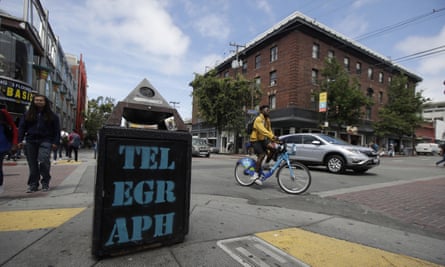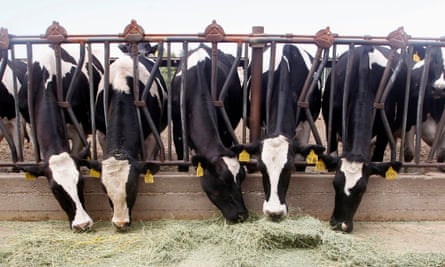America’s largest gas utility is trying to thwart efforts to limit the use of natural gas in California beyond usual corporate lobbying efforts, going so far as to establish and fund a consumer group that pushes for “balanced energy solutions”.
SoCalGas, a subsidiary of Sempra Energy that provides natural gas to nearly 22 million customers in California, says it does not direct the consumer group Californians for Balanced Energy Solutions (C4Bes). But documents show it funded the organization from its launch, paying outside consultants to develop the not-for-profit group, establish “the organization’s messages and themes” and recruit board members.
In April, a SoCalGas employee emailed several local government employees across California: “I have been asked by our senior leadership team to identify some key Latino leaders that might consider supporting the current [C4Bes] effort.”
SoCalGas and C4Bes promote continued investment and support of the gas system to industry and municipal governments. They pitch “renewable” gas as an alternative method of greening the grid and fighting the climate crisis. But in internal emails, C4Bes acknowledged serious potential climate and affordability limitations with the renewable gas supply.
On Tuesday, the city of Berkeley in northern California became the first in the country to ban natural, fossil gas hook-ups in new buildings. More than 50 other cities and counties across California are considering similar moves away from gas to electricity.
SoCalGas is the largest gas utility in the US, servicing roughly half of California. With its core business on the line, the utility is a strong opponent of building electrification, said Panama Bartholomy, the director of the Building Decarbonization Coalition.

“They’re using scare tactics and misleading communities about what policies are actually being considered,” said Bartholomy, pointing to a SoCalGas suggestion in February that the state could require consumers to buy all new electric appliances.
While environmental advocates push cities to turn off the gas, SoCalGas has undertaken state and local lobbying efforts of its own, encouraging cities to pass resolutions committing to “balanced energy solutions”. In contrast to the several dozen California municipalities exploring electrification rules, more than 10 cities and counties have voted to sign on to the SoCalGas resolution so far.
But much of SoCalGas’s advocacy has been cloaked in C4Bes, the not-for-profit the utility paid to establish.
C4Bes advocates for the continued use of natural fossil gas in California. The organization’s open letter to Governor Gavin Newsom calls building electrification “as simple as it is unrealistic”.
C4Bes applied to participate in state regulatory proceedings on decarbonization. But in July, the California Public Utilities Commission’s consumer advocate office alleged that SoCalGas not only provided the funding to establish C4Bes, but used ratepayer funds to do it.
According to state filings, SoCalGas began paying the bills for C4Bes in March 2018. The not-for-profit was registered with the state nearly a year later, in January 2019.
Legal representatives for the environmental advocacy group Sierra Club asked state regulators to ban C4Bes from acting as a consumer advocacy coalition in the public utilities commission’s decarbonization rulemaking proceedings – otherwise, they say, SoCalGas would be unfairly overrepresented.
“While SoCalGas feigns umbrage at the characterization of C4Bes as an astroturf or utility front group, these terms refer to exactly what is at issue here: entities who hide their sponsorship to appear independent,” the attorney Matt Vespa wrote in the Sierra Club’s motion to deny C4Bes party status in the proceedings.
When the Guardian contacted SoCalGas with a request for comment on a story about Berkeley’s natural gas ban, the utility did not respond. Instead SoCalGas appeared to have forwarded that request to C4Bes and a spokesperson for the group got in touch with a Guardian reporter.
Still, C4Bes maintains that SoCalGas does not direct the group’s position or activities. “The simple fact is that the gas company is one of 31, soon to be 32 board members. We have three officers, none of which are connected to the gas company, who steer the organization,” said Jon Switalski, the executive director of C4Bes. “We’ve received a lot of funding from a lot of other different sources. This is a very diversified coalition.”
SoCalGas and C4Bes don’t deny the existence of the climate crisis. They promote the use of “clean”, “renewable” gas in the form of methane captured from dairies, wastewater treatment plants and landfills, and claim that using biogas in place of fossil gas would reduce emissions, and prove cheaper than full electrification. Earlier this year, SoCalGas announced a goal to replace 20% of its natural fossil gas supply with renewable gas as a step toward “decarbonizing the gas supply”. Experts, including those who work in renewable gas and with C4Bes, say that simply won’t work.

“There’s a lot of folks who believe we can decarbonize the pipeline simply by replacing fossil natural gas with renewable gas,” said the Dairy Cares executive director, Michael Boccadoro. “I’m not one of those people.” Boccadoro is a C4Bes board member, but he does not agree with the organization’s position on the potential for biogas, which is currently used mainly as trucking fuel.
In the next five years, California is on track to have 120-140 dairy farm methane digesters capturing and harnessing fugitive, climate-warming methane – with the help of significant state grant funding. “Dairy biogas is way too expensive” to use in homes or businesses, said Boccadoro – five to 10 times more expensive than fossil gas.
According to emails obtained by the Climate Investigations Center, C4Bes and SoCalGas are aware of Boccadoro’s “important caveats”, but continue to promote biogas as a better alternative to electrification.
“I am on record supporting this move by SoCalGas which will help reduce greenhouse gas emissions. However, the points made by Michael [Boccadoro] should be taken seriously and it deserves careful review,” the chair, Matt Rahn, wrote in an email to C4Bes board members in March. Rahn also called for a “fair, open, and transparent” conversation about the future of renewable gas.
In an interview, however, Switalski called Boccadoro’s conclusions “just one individual’s opinion”. Switalski suggested that renewable gas could be subsidized like solar energy.
“It doesn’t pencil out and it doesn’t make all that much sense from an environmental standpoint,” said Boccadoro. “It’s a pipe dream.”
